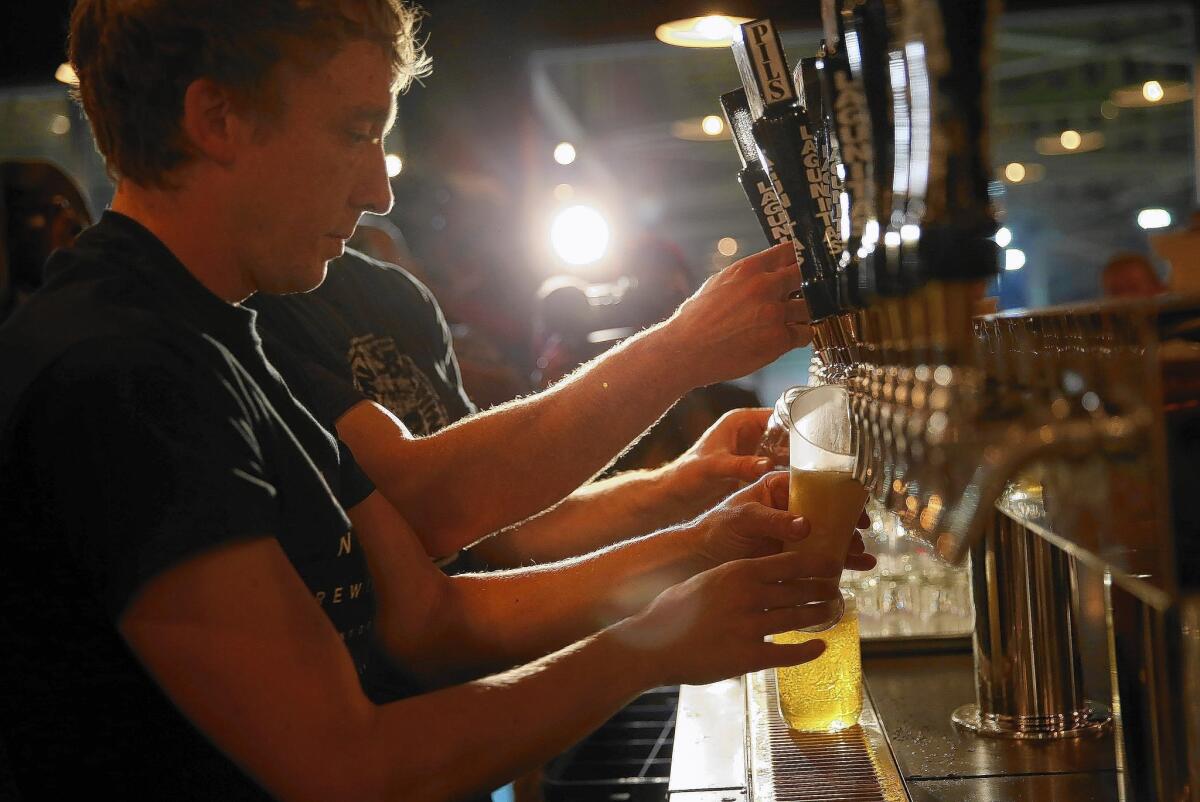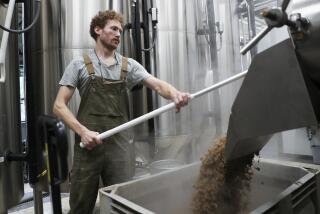State craft brewers fear drought could alter business, and the beer

When Lagunitas Brewing Co. fills its beer bottles, Northern California’s Russian River provides the main ingredient.
Lagunitas has become one of the fastest-growing stars of California’s booming craft beer scene. But the Russian River is shrinking after three years of punishing drought.
“We are at the maximum growth threshold here in California because of water,” said Leon Sharyon, chief financial officer for Lagunitas, which uses nearly 2 million gallons of river water a year at its Petaluma brewery.
Breweries run through an average of four to seven gallons of water to end up with one gallon of beer. With California in the midst of a water crisis, breweries are scrambling.
California is home to more than 400 craft brewers — the most in the country. They sold $4.7 billion worth of beer in 2012, about 17% of the state’s total beer sales, according to the most recent statistics from the California Craft Brewers Assn.
Small brewers worry that they could have trouble meeting thriving demand with limited water. Prices could go up, they warn, if they have to spend for conservation measures or scrounge up new supplies.
“If this drought continues for two, three more years, that could greatly impact the production and growth of our breweries,” said Tom McCormick, the association’s executive director.
Lagunitas, for instance, just opened a major brewhouse in Chicago, where Lake Michigan stands ready to supply its water needs. The company is shifting some production there, Sharyon said, adding: “Our next plant will probably be out of state and next to a stable water supply.”
The drought could have an outsized effect on craft brewers because small operators on average use twice as much water per barrel of beer than do large, traditional breweries.
“It takes more water to make beer than it does to make water,” quipped Harry Schuhmacher, publisher of trade journal Beer Business Daily.
“Most won’t say it,” he explained, “but water is a major reason craft beer behemoths such as Sierra Nevada and New Belgium opened plants in Asheville,” on the western edge of North Carolina. “It’s no coincidence that big brewers are congregating around the Smoky Mountains’ substantial water supply.”
Beer maker Evan Weinberg, cofounder of Cismontane Brewing Co. in Rancho Santa Margarita, said that if the state doesn’t get “a big influx of water soon,” he and other microbrewers are going to have “some serious issues.”
“Small brewers waste more water than the big guys because our equipment is less efficient,” Weinberg said.
The microbrewer produces 3,000 barrels of beer a year and gets its water delivered by the Santa Margarita Water District from Northern California sources and the Colorado River. The district enacted a voluntary 20% water reduction, but Weinberg is anxious that the district might make that mandatory.
“If that happens, we will have to pass the cost of water onto the consumer; otherwise we will go out of business,” he said. “I hope people love our beer enough to pay a little more.”
At downtown Los Angeles’ City Tavern, General Manager Matt Meiers hasn’t had to increase prices yet. Meiers calculates if the drought goes another year, “beer drinkers will definitely feel it.”
“If a microbrewer loses a water source that makes the beer what it is, that’s a problem,” he said.
Like Lagunitas, Cloverdale’s Bear Republic gets its water from the Russian River, but strict regulations in its water district forced it to limit production, said Master Brewer Peter Kruger.
“We have a water cap of 8 million gallons a year, and that’s really affected our growth,” Kruger said.
Bear Republic is installing a waste water-filtration system and helped bankroll the construction of two wells. Plans to grow 35% this year were cut to 15%. Kruger said there are discussions about opening a brewery elsewhere with a “more stable water supply,” but that could alter the taste.
“Our river’s mineral content creates really excellent beer, and we are afraid of losing that,” Kruger said. “We are praying it rains next winter.”
The drought has pushed brewers of all sizes to conserve by changing nozzle sizes on equipment, cutting down on bottle washes and using recycled water, among other things. Large breweries are devoting significant effort to water conservation.
MillerCoors has cut companywide water consumption 9.2% since 2012. Anheuser-Busch, with a sprawling plant in Van Nuys, has reduced companywide usage 32% since 2011.
MillerCoors’ 200-acre Irwindale brewery slashed its 20 acres of plush grass in half, saving more than 15 million gallons of water a year, said Edward Gharavi, the brewery’s technical services manager.
The beer giant has made changes inside the brewery, such as switching from metal conveyor belts to plastic. The metal belts had to be sprayed with water to help the bottles slide, but plastic belts can do the job without liquid assistance, saving the plant 200,000 gallons a year.
In the past two years, Lagunitas cut water use 10%, Sharyon said.
Recently, Lagunitas has had to blend in some well water, and executives are concerned that water officials might require the brewer to switch completely. Well water is heavy with minerals that could change the color and taste of some products, Sharyon said.
“Grainy and hoppy styles could taste more astringent,” he said. Lagunitas invested in a new filtration system, which might eliminate odd groundwater tastes, he said.
Some of the smallest brewers can’t afford such expensive changes, said Kruger of Bear Republic.
“We took water for granted before this,” Kruger said, “and we have learned a valuable lesson.”
Twitter: @bri_sacks






